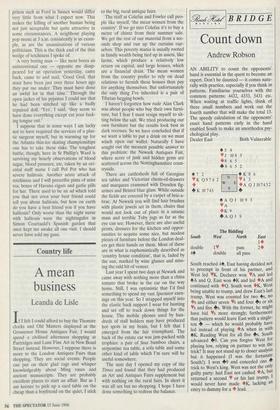MADEIRA
BRIDGE
Count down
Andrew Robson
AN ABILITY to count the opponents' hand is essential in the quest to become an expert. Don't be daunted — it comes natu- rally with practice, especially if you think in patterns. Familiarise yourselves with the common patterns: 4432, 4333, 5431 etc. When waiting at traffic lights, think of three small numbers and work out the fourth number that will make the total 13. The speedy calculation of the opponents' exact hand patterns early in the hand enabled South to make an unorthodox psy- chological play.
Dealer East 47 2
VK Q9 7 6 • 4K 10 743
2 45 VJ • 8 48 4 108 6 5 6 5
Both Vulnerable
5
2 4 K 8 6 V4 3
• A Q J107432 W N
E
S
4A QJ 109 3 VA • K 9 4AQJ 9 The Bidding South West North East 1* double 1V pass 2* 44 double all pass South reached 44, East having decided not to preempt in front of his partner, and West led VIC. Declarer won VA and led 4A and Q. East won 4K and led •A and continued with *Q. South won •K, West being unable to trump, and drew East's last trump. West was counted for two 4s, no • s and either seven Vs and four 4s or six Vs and five 4s. With the former, he might have bid Vs more strongly; furthermore that pattern would leave East with a single- ton 4 — which he would probably have led instead of playing •A when in with 4K. Reading West for all five 4s, South advanced 49. Can you forgive West for playing low, relying on partner to win the trick? It may not stand up to closer analysis but it happened (I was the fortunate South!). I won 49 and conceded one • trick to West's king. West was not the only guilty party: had East not cashed •A, but returned a second V or his last trump, I would never have made •K, lacking an entry to dummy for a • lead.


































































 Previous page
Previous page